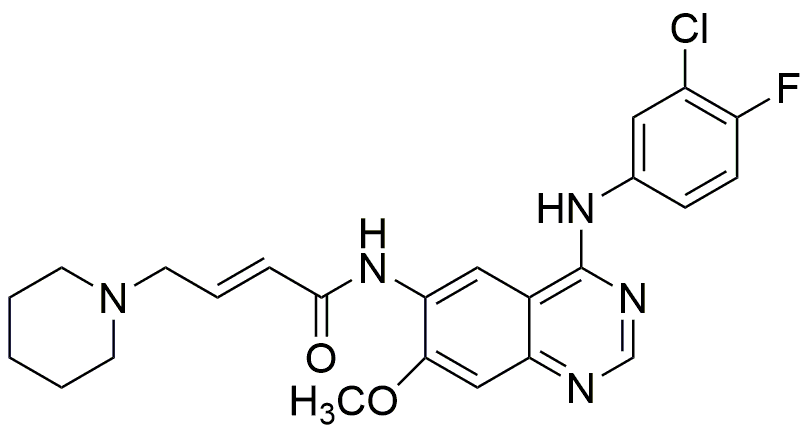Dacomitinib is widely utilized in research focused on:
- Targeted Cancer Therapy: This compound is primarily used in the treatment of non-small cell lung cancer (NSCLC). By inhibiting specific pathways, it helps to block tumor growth and spread, offering a more effective treatment option compared to traditional chemotherapy.
- Clinical Trials: Dacomitinib is frequently involved in clinical trials aimed at evaluating its efficacy and safety in various cancer types. Researchers benefit from its targeted action, which allows for more precise patient selection and potentially better outcomes.
- Personalized Medicine: The use of Dacomitinib supports the growing field of personalized medicine, where treatments are tailored based on genetic markers. This approach enhances treatment effectiveness and minimizes side effects for patients with specific mutations.
- Combination Therapies: It is often studied in combination with other therapeutic agents to improve treatment regimens. This strategy can lead to synergistic effects, increasing the overall effectiveness against resistant cancer types.
- Research on Resistance Mechanisms: Dacomitinib is valuable in research aimed at understanding resistance mechanisms in cancer therapies. Insights gained can guide the development of next-generation inhibitors and improve treatment strategies.
Informations générales
Propriétés
Sécurité et réglementation
Applications
Dacomitinib is widely utilized in research focused on:
- Targeted Cancer Therapy: This compound is primarily used in the treatment of non-small cell lung cancer (NSCLC). By inhibiting specific pathways, it helps to block tumor growth and spread, offering a more effective treatment option compared to traditional chemotherapy.
- Clinical Trials: Dacomitinib is frequently involved in clinical trials aimed at evaluating its efficacy and safety in various cancer types. Researchers benefit from its targeted action, which allows for more precise patient selection and potentially better outcomes.
- Personalized Medicine: The use of Dacomitinib supports the growing field of personalized medicine, where treatments are tailored based on genetic markers. This approach enhances treatment effectiveness and minimizes side effects for patients with specific mutations.
- Combination Therapies: It is often studied in combination with other therapeutic agents to improve treatment regimens. This strategy can lead to synergistic effects, increasing the overall effectiveness against resistant cancer types.
- Research on Resistance Mechanisms: Dacomitinib is valuable in research aimed at understanding resistance mechanisms in cancer therapies. Insights gained can guide the development of next-generation inhibitors and improve treatment strategies.
Documents
Fiches de données de sécurité (FDS)
La FDS fournit des informations de sécurité complètes sur la manipulation, le stockage et l’élimination du produit.
Spécifications du produit (PS)
Le PS fournit une description complète des propriétés du produit, notamment sa composition chimique, son état physique, sa pureté et les exigences de stockage. Il détaille également les plages de qualité acceptables et les applications prévues du produit.
Certificats d'analyse (COA)
Recherchez des certificats d'analyse (COA) en saisissant le numéro de lot du produit. Les numéros de lot et de lot se trouvent sur l'étiquette d'un produit, après les mots « Lot » ou « Lot de fabrication ».
Numéro de catalogue
Numéro de lot/série
Certificats d'origine (COO)
Ce certificat d'exploitation confirme le pays dans lequel le produit a été fabriqué, et détaille également les matériaux et composants utilisés et s'il est issu de sources naturelles, synthétiques ou autres sources spécifiques. Ce certificat peut être requis pour les douanes, le commerce et la conformité réglementaire.
Numéro de catalogue
Numéro de lot/série
Fiches de données de sécurité (FDS)
La FDS fournit des informations de sécurité complètes sur la manipulation, le stockage et l’élimination du produit.
DownloadSpécifications du produit (PS)
Le PS fournit une description complète des propriétés du produit, notamment sa composition chimique, son état physique, sa pureté et les exigences de stockage. Il détaille également les plages de qualité acceptables et les applications prévues du produit.
DownloadCertificats d'analyse (COA)
Recherchez des certificats d'analyse (COA) en saisissant le numéro de lot du produit. Les numéros de lot et de lot se trouvent sur l'étiquette d'un produit, après les mots « Lot » ou « Lot de fabrication ».
Numéro de catalogue
Numéro de lot/série
Certificats d'origine (COO)
Ce certificat d'exploitation confirme le pays dans lequel le produit a été fabriqué, et détaille également les matériaux et composants utilisés et s'il est issu de sources naturelles, synthétiques ou autres sources spécifiques. Ce certificat peut être requis pour les douanes, le commerce et la conformité réglementaire.


